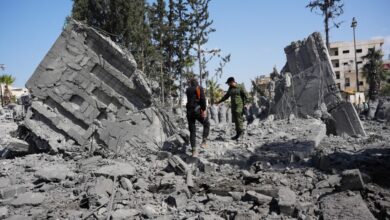Erdogan suggests unilateral Turkish military incursion into northern Syria is imminent
Turkey has 'no other choice other than to proceed on our own path' after buffer zone deadline expires
Turkish President Recep Tayyip Erdogan has said his country’s patience with U.S. efforts to create a buffer zone along the northeast Syrian border was running out, indicating a military operation was imminent.
Erdogan has been threatening for months to launch a military incursion into northeast Syria to clear the area of local fighters led by the predominantly-Kurdish Syrian People’s Protection Units (YPG), who are supported on the ground and in the air by the U.S.-led international Coalition to defeat Islamic State.
Erdogan previously said that if Turkey’s demands regarding the border zone were not met by the end of September, the country would be forced to act unilaterally.
“At the current stage, we have no other choice other than to proceed on our own path,” Erdogan said in a televised speech on Tuesday, October 1.
“We have tried every path. We have been extremely patient,” he said. “We cannot afford to lose a single day.”
NATO allies Turkey and the United States reached a preliminary agreement in August on steps to establish a buffer zone to keep the YPG away from the Turkish border and facilitate the transfer of Syrian refugees, currently living in Turkey, into the border area.
The U.S. and Turkey have since conducted a number of joint ground and helicopter patrols on the Syrian side of the border, and Turkey resumed F-16 flights over the northeast in Coalition airspace, but the two countries disagree over the final depth of the border zone. Erdogan has demanded some 30 km, which would encompass most majority-Kurdish population centers in Syria.
The YPG has begun withdrawing from the border and destroying its fortifications, but Syrian Kurdish leadership has rejected what they see as Erdogan’s plan to demographically re-engineer majority-Kurdish areas of northern Syria. They have also said their forces will not pull back from the border further than they have already agreed, which ranges between 5 and 14 km.
Syrian Kurdish leaders have also said only Syrian refugees originally from northeast Syria and who have been screened for ties to terrorist groups may return.
Turkey considers the predominantly-Kurdish Syrian People’s Protection Units (YPG), which forms the backbone of the SDF, to be a terrorist organization inextricably linked to the Kurdistan Workers’ Party (PKK), which has waged a decades-long insurgency against the Turkish government.
“We are of course aware of the economic, social and cultural challenges caused by 3.6 million refugees because the Syrian crisis has been protracted,” Erdogan said on Tuesday.
He accused Western countries of deliberately refusing to share the refugee burden, saying they did so “to bring our country to its knees.” Erdogan has previously said his government may “open the gates” of Syrian refugees to Europe if Turkey’s demands on the safe zone are not met by the U.S.
“I am asking you: Is Turkey a weak country that can accept such an imposition, blackmailing and vile game?”
Turkey has launched two previous incursions into northwest Syria, taking control of much of Idlib province with Operation Euphrates Shield in 2016 and the Kurdish enclave of Efrin in January 2018 under Operation Olive Branch.
Turkey’s incursion into Efrin led to mass civilian displacement and United Nations accusations of possible war crimes, including looting, hostage-taking and torture, by Turkey-backed Islamist Syrian rebels. The YPG has vowed to retake Efrin, and YPG-linked groups have claimed credit for a number of bombings and assassinations in the area.
The Turkish government has said its incursions have allowed more than 300,000 Syrian refugees to return to areas taken over in northwest Syria.
The U.S. has signaled willingness to facilitate Turkey’s proposal to resettle Syrian refugees into the border zone, saying that it must be done with the help of the U.N.
With reporting from AFP












